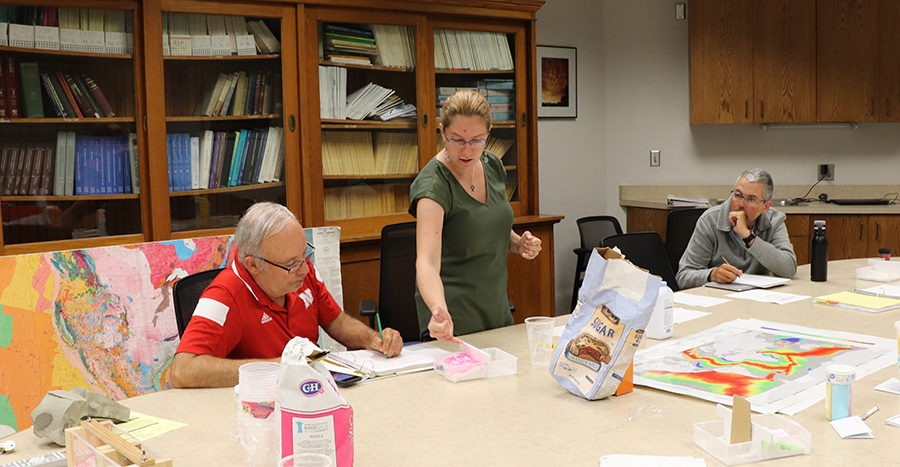
Planning to take a graduate course this summer to continue your professional development or to get one step closer to earning your master’s degree? Do you need additional graduate hours in mathematics or science in order to be eligible to teach dual-enrollment courses at your high school? Registration opened Monday, March 5, for summer courses at Nebraska. We are offering three new courses in Summer 2018!
(Note to returning students: It's possible that MyRED has assigned you an enrollment date depending on your current status so please take note of that if you are not able to register right away on Monday.)
To enroll in UNL graduate courses, follow the steps outlined on the Nebraska Math and Science Summer Institutes website, http://scimath.unl.edu/nmssi . This year we are offering 25 courses across the state and online to meet your professional development needs. Check out our course catalog, which supplies the needed class numbers for either Teach Nebraska registration or MyRED. For all in-person NMSSI courses, current Nebraska teachers automatically qualify for a tuition fellowship from UNL equal to 20 percent of in-state, graduate tuition. The NMSSI Fellowship Application will in late March at http://go.unl.edu/scimathapply . Remember, paid lunches are not included in the courses this summer.
New courses this year, and their primary audiences, are:
*CYAF 890A: Differentiation for Accelerated Learners in Mathematics (grades K-6 teachers)
*TEAC 808E: Improvement of Instruction in School Mathematics – Classroom Discourse (grades 7-12 math teachers)
*GEOS 898: Nebraska Geology Through Time (K-12 teachers of science)
COURSE DESCRIPTIONS:
CYAF 890A - Workshop Seminar: Early Childhood, Differentiation for Accelerated Learners in Mathematics (Class # 9323)
June 4-8, 9:30 a.m. to 3:30 p.m. with additional work online
Location: ESU 3 office, La Vista, Nebraska
Instructor: Kelley Buchheister, Child, Youth and Family Studies, UNL
The focus of this three-credit course is to use an equity lens to enhance mathematics instruction in the early childhood and elementary setting (Preschool through grade 6). Specifically, the course is designed to enhance teachers’ understanding of how accelerated learners approach mathematics, and provide opportunities for practicing teachers to closely examine: (a) the mathematical reasoning of accelerated learners, (b) instructional strategies that appropriately challenge more advanced mathematics learners, (c) assessment practices that focus on tasks that promote high levels of cognitive demand, and (d) enrichment resources or materials aligned to Nebraska’s standards and expectations. In addition, students will use Gutierrez’s four dimensions of equity when planning or implementing lessons to address the needs of all children—particularly focusing on the specific strengths, needs, and challenges of working with accelerated learners in early math.
TEAC 808E: Improvement of Instruction in School Mathematics – Classroom Discourse (Class # 4727)
July 23-27, 8 a.m. to 5 p.m.
Location: 204 Henzlik Hall, UNL Campus
Instructor: Lorraine Males, TLTE, UNL
This course will engage secondary mathematics teachers in understanding classroom discourse and its relationship to student learning. Readings, discussions, and activities will provide opportunities for teachers to develop an awareness for how classroom discourse influences the opportunities we provide to students and to provide support for teachers in analyzing their own discourse patterns and their impact on student learning. One of the major components of the work will involve examining your own classroom discourse practices.
GEOS 898: Nebraska Geology Through Time
July 9-13, 8 a.m. to 5 p.m. (Class # 3319)
Location: 203 Bessey Hall, UNL Campus
Instructor: Cara Burberry, Earth and Atmospheric Sciences, UNL
This course is a one-week tour through key events in the geologic history of Nebraska. We will begin 1.8 billion years ago, with the mountain-building events that created the oldest rocks in Nebraska. Subsequently, we will step through time in chronological order, taking a couple of half-day field trips to look at ~300 million-year-old rocks within easy driving distance of Lincoln. The course includes a tour of the paleontology displays in the State Museum, learning in detail about the Highway Paleontology program and Nebraska's Cenozoic Megafauna. We will finish with an overview of relatively recent (~5 million year) geomorphologic and geologic process in Nebraska, so that students are equipped to incorporate a Nebraska-based examples into a variety of learning modules.
Please note that this year, every course must have 12 teachers enrolled in order to run.
:::::::::::::::::::::::::
Be a lifelong learner.
Center for Science, Mathematics & Computer Education
http://scimath.unl.edu/nmssi